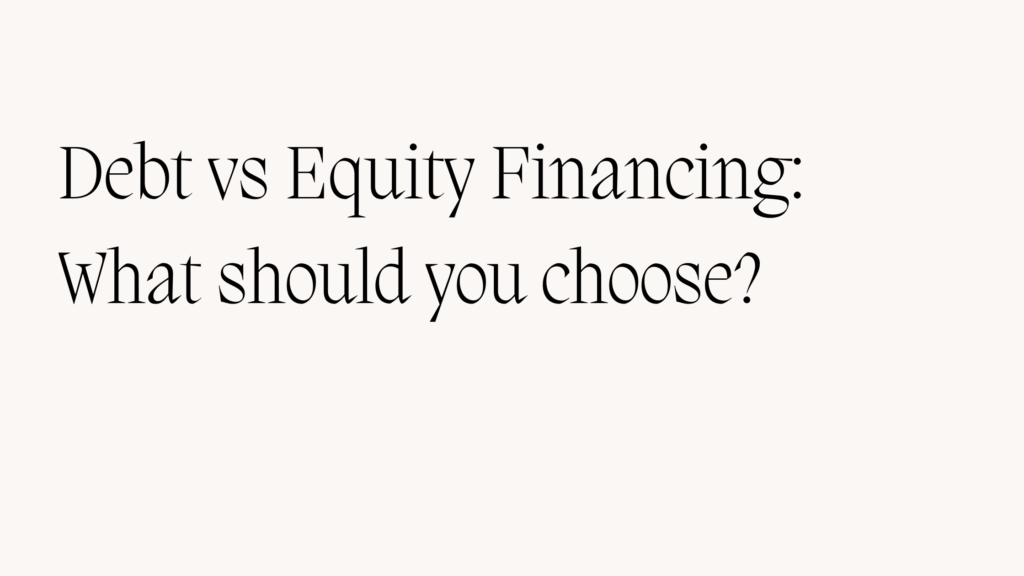Any company that aims to raise money has two options to do so- either sell a part of the ownership and receive money or borrow money and repay the same with interest.
The scope of this article is limited to the perspective of venture capital financing and early-stage companies
Equity Financing
When money is raised by selling part of the company, it is called equity financing. Here, the incoming investor becomes a shareholder and stakeholder in the business and as a result is entitled to certain rights.
This type of financing is mostly undertaken when the company is either in early-stage and has no robust cash-flows or revenues coming in. Also, some technology-based ventures take time to generate money and they need enough money to sustain their options until they create a minimum viable product (MVP) or attain a proof-of-concept of the business. In these situations, equity financing may help as there is no obligation to repay the money.
From the investors’ perspective, the investment can be either a financial investment or strategic investment into a company. So the founder has to decide what is best for the company at that given stage.
Debt Financing
Debt financing is nothing but taking a loan and repaying it with interest. The good part about debt financing is that you do not give up any ownership in the company. The lender has no say in the affairs of your company and the relationship ends the moment you clear your debt obligation. However, debt is an ‘enforceable’ obligation i.e. if you default on payments, the lender can take you to court. Also access to debt is contingent on the credit history and most companies in early stage do not get easy access to debt. Hence, while debt financing has its advantages, defaulting on debt can severely damage the reputation of the company and can lead to insolvency proceedings against a company that can either result in liquidating assets to pay-off the debt or winding up the company.
Which is better – Debt or Equity?
As discussed above, the type of financing depends on the stage and financial health of the company. If the business is generating enough money and is profitable, it is better to take a loan and service the debt, whilst preserving the ownership which can become very valuable in the future and more importantly afford control to run the company.
Which is cheaper- Debt or Equity?
Commonly, debt is considered cheaper than equity as it is considered the value of equity will always increase with time. While the obligation of debt may extinguish with the time, the value of an asset is commonly assumed to increase over time, hence, if you are generating enough money to meet your debt obligations, you should aim to preserve equity unless for strategic reasons. However, revenue and cash-flows are hard to come through during the early stages of a company and moreover, the company may not qualify for a debt because of lack of credit history. Therefore, most early-stage companies or start-ups choose to dilute equity to finance their operations.
Example
Imagine you own a 1000 Square feet property that is worth about $1000. You want to develop that property and let it out for a monthly rent of $50. To make it rent-worthy, you need $500 to renovate the property. You forecast that you can sell the property for $2000 in 5 years. How would you finance your requirement- debt or equity?
Let us see the scenarios
Equity finance
- Sell 50% of the ownership in the property and raise $500.
- You do not have obligations to pay the debt back.
- You get to keep 50 % of the monthly rental i.e. $25
- When you sell the property in 5 years, you get 50% of the sale proceeds i.e. $1000.
- Your total gain- 5-year rental income ($25 X 12 X 5) i.e. $1500 + $1000 sale proceed- $2500.
- Profit- $2500 -$1000= $1500 dollars in 5 years.
Debt finance
- You are offered a loan of $500 at 10% (Simple Interest for simplicity!) per year
- The debt burden (interest) is $50 per year
- Assume it’s a term loan for 4 years and no early closure
- Interest for 4 years- $50 X 4= $200
- Total Amount= Principal + interest= $500 + $200 = $700
- No dilution in ownership, hence 100% rental income to you
- Rental income for 5 Years- $50 X 12 X 5= $3000
- Net profit = $3000 – $700= $2300
- Sale proceeds at the end of 5 years = $2000
- Total profit at the end of 5 years= $2300 + $2000 = $4300
The difference in Debt and Equity financing is $4300 – $1500 = $2800. Hence, debt is cheaper by $2800.
Hope this helps to clarify the concept of debt and equity financing. You can reach me at [email protected]
PS- this is an ideal scenario. As discussed without predictable cash-flows, it may become difficult to meet debt obligations. Notwithstanding the same, in most cases, debt is considered to be cheaper than equity as equity is commonly assumed to appreciate in value over time (like the property value discussed above).
